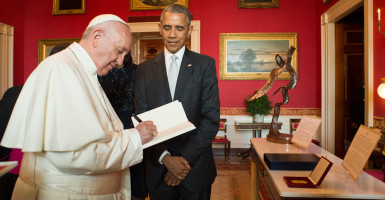Pope Francis, with allegiance to Catholic doctrine, spoke out in support of religious liberty to the 11,000 ticketed guests on the South Lawn of the White House Wednesday.
In his speech, the pope made clear that religious liberty is an important freedom in the United States.
“With countless other people of goodwill, [American Catholics] are likewise concerned that efforts to build a just and wisely ordered society respect their deepest concerns and their right to religious liberty,” Francis said.
Francis continued in his slow, accented English, “[A]ll are called to be vigilant, precisely as good citizens, to preserve and defend that freedom from everything that would threaten or compromise [religious liberty].”
Francis has stated previously that religious liberty is a “fundamental right.” President Barack Obama, in his remarks to welcome the pope, acknowledged, “Here in the United States, we cherish religious liberty.”
In reaction to the pope’s speech at the White House, Roger Severino, director of the DeVos Center for Religion and Civil Society at The Heritage Foundation, told The Daily Signal:
“Pope Francis explicitly joined the U.S. bishops’ call to defend religious liberty and turned to address Obama directly when he mentioned things that would ‘threaten and compromise it.’”
Severino added, “While President Obama mentioned the persecution of Christians abroad in his remarks, Pope Francis chose to highlight the deep concerns of people of faith about the state of religious freedom here in America.”
The First Amendment guarantee of religious freedom has been at the forefront of political debates in America recently.
After the U.S. Supreme Court decision in June to legalize gay marriage in America, Kentucky county clerk Kim Davis cited her religious beliefs when she stopped issuing marriage licenses. She was ordered by a federal court to issue marriage licenses even though same-sex marriage went against her faith.
Davis wound up in jail after she did not comply with the court order. She was later released after a national outcry that drew Republican presidential candidates to her defense.
Davis is not alone. Turmoil over religious liberty is a growing concern for others in the United States.
Blaine Adamson, a Kentucky print shop owner, refused to print gay pride festival T-shirts due to his religious beliefs. While a Kentucky court ruled in Adamson’s favor, saying that he had the right not to print the shirts, other decisions have gone the opposite way.
For instance, Washington florist Barronelle Stutzman was sued for discrimination after she chose not to make a floral arrangement for a gay customer’s wedding. Her case is now being considered for review by the Washington Supreme Court.
Others have been fined for not compromising on their religious beliefs. Oregon bakers Aaron and Melissa Klein were ordered by the government to pay a $135,000 penalty for refusing to bake a cake for a lesbian couple’s wedding.
In addition to his defense of religious liberty, the pope also spoke out for traditional values. Francis warned that the institution of marriage and family need to be protected. Severino said the pope’s top priorities on his trip to the United States are marriage, family, and religious liberty.
Francis will deliver a speech to Congress Thursday morning.






















